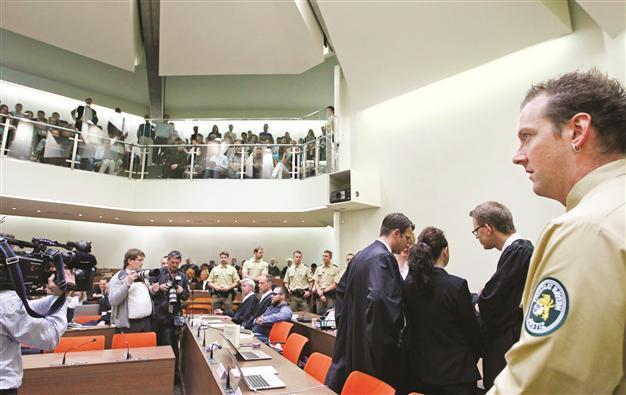Neo-Nazi cell in Germany known since early 2000s
BERLIN

Defendant Zschaepe (3R), accused of being at the heart of the neo-Nazi NSU cell, stands with her lawyers before the fourth session of her trial in Munich. AFP photo
The German neo-Nazi cell, the National Socialist Underground (NSU), was considered a “terrorist” cell by intelligence officials before beginning its murder spree in 2000, a new report has said.German public broadcaster SWR aired May 21 an investigative journalism feature called “Report Mainz,” which said it had obtained investigators’ correspondence suggesting that Saxony’s domestic intelligence service had already considered the NSU to “resemble” a terrorist cell before its first murder.
Investigators in the eastern state of Saxony in a letter dated April 2000, before the far-right cell had committed its first of 10 murders in Germany, wrote that the trio could be considered similar to a terror cell, according to Deutsche Welle.
“The group’s methods resemble the strategy of terrorist groups, which pursue a collective goal through the division of tasks,” the letter said, adding that in the trio’s particular case, “a considerable increase in intensity up to and including the most serious crimes is identifiable.”
Such escape is possible only with ‘confidants’
The NSU cell is suspected of involvement in the killings of 10 people, eight of them Turks, between 2000 and 2007.
A trial against the cell’s sole surviving member, Beate Zschaepe, continues in a Munich court.
Authorities were particularly concerned by their ability to go to ground so professionally, leaving barely a trace, once they became aware of police attention.
Such an effective disappearance “would not have been achievable” without help, the letter said. “Such an escape is possible only with the closest of connections within a closed loop of a few, discrete confidants.” A former government spokesman, Uwe-Karsten Heye, told Report Mainz that the letter ultimately showed that if the German authorities “had stayed on the case, this series of murders might never have happened.”
















